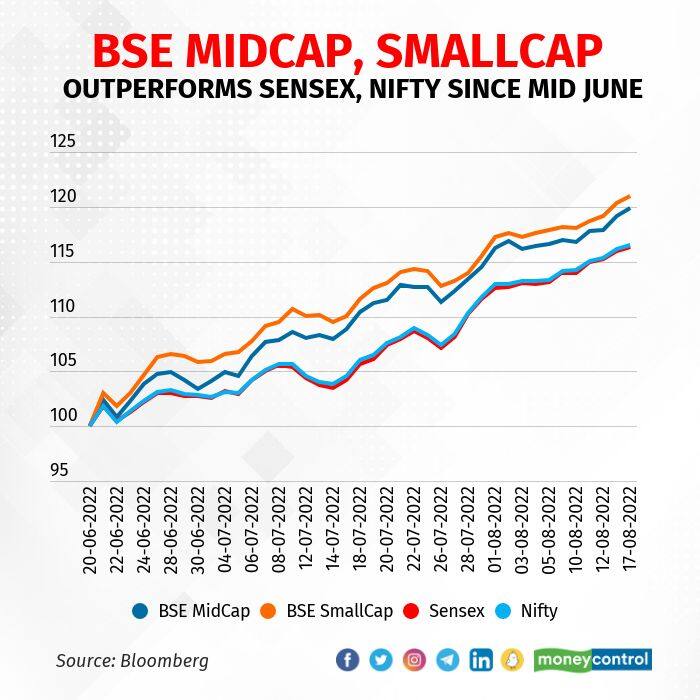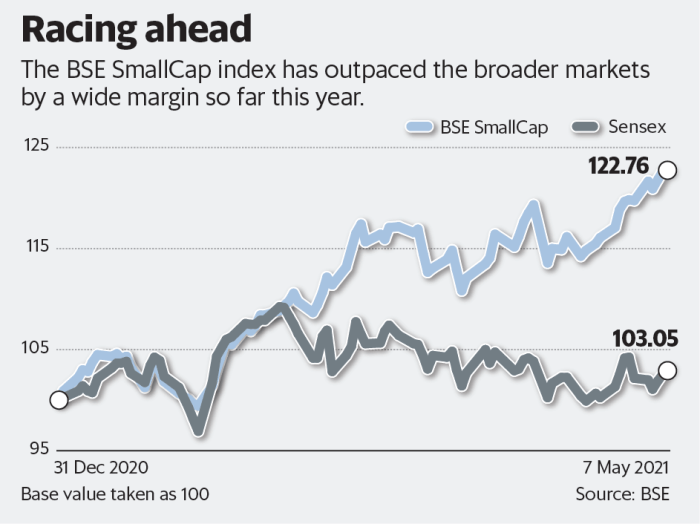Exploring BSE SmallCap Index Trends: What They Indicate for Retail Investors

Diving into BSE SmallCap Index Trends: What They Indicate for Retail Investors, this introduction immerses readers in a unique and compelling narrative, offering insights into the significance of tracking trends in this index and how they differ from other market indicators.
The following paragraphs will delve deeper into the key factors influencing these trends, the impact of economic events, and strategies for managing risks associated with investing in small-cap companies.
Introduction to BSE SmallCap Index Trends
The BSE SmallCap Index is a stock market index that tracks the performance of small-cap companies listed on the Bombay Stock Exchange (BSE). Small-cap companies are typically smaller in market capitalization compared to large-cap and mid-cap companies.
For retail investors, tracking trends in the BSE SmallCap Index is significant as it provides insights into the performance of smaller companies in the market. Small-cap stocks are known for their potential to generate higher returns but also come with higher risk compared to large-cap stocks.
By monitoring the trends in this index, retail investors can assess the overall health of the small-cap segment and make informed investment decisions.
Significance of BSE SmallCap Index Trends
- Small-Cap Focus: The BSE SmallCap Index specifically focuses on small-cap companies, providing a unique perspective on this segment of the market.
- Risk Assessment: Tracking trends in this index helps retail investors in assessing the risk associated with small-cap stocks and adjusting their investment strategies accordingly.
- Diversification Opportunities: Small-cap stocks offer diversification opportunities for investors looking to spread out their portfolio across different market segments.
Factors Influencing BSE SmallCap Index Trends

Understanding the key factors that influence the trends in the BSE SmallCap Index is crucial for retail investors looking to make informed decisions.
Economic Indicators Impact
Economic indicators play a significant role in driving the performance of small-cap stocks within the BSE SmallCap Index. Factors such as GDP growth, inflation rates, interest rates, and consumer spending can all impact the overall economic environment, thus influencing the performance of small-cap companies.
Market Sentiment Influence
Market sentiment, often driven by investor emotions, perceptions, and expectations, can heavily influence trends in the BSE SmallCap Index. Positive sentiment can lead to increased buying activity and upward trends, while negative sentiment can result in selling pressure and downward movements in the index.
Impact of Economic Events on BSE SmallCap Index Trends
Economic events play a crucial role in influencing the trends of the BSE SmallCap Index. Various factors such as interest rate changes and GDP growth can have significant impacts on how the index performs. Let's delve deeper into how these events affect the BSE SmallCap Index and compare its reaction to global economic events versus local economic developments.
Effect of Interest Rate Changes
Interest rate changes by the central bank have a direct impact on the BSE SmallCap Index. When interest rates are lowered, it becomes cheaper for companies to borrow money, leading to increased investments and potentially higher stock prices. Conversely, an increase in interest rates can have a negative effect on stock prices as borrowing becomes more expensive.
Impact of GDP Growth
GDP growth is another crucial economic indicator that influences the BSE SmallCap Index trends. A robust GDP growth generally indicates a healthy economy, leading to increased investor confidence and higher stock prices. On the other hand, a slowdown in GDP growth can result in a decline in stock prices as investors become more cautious.
Comparison of Global vs. Local Economic Events
The BSE SmallCap Index is not immune to global economic events such as geopolitical tensions, trade wars, or financial crises. These events can cause volatility in the market, impacting the index's performance. However, local economic developments like government policies, regulatory changes, or sector-specific news can also play a significant role in shaping the index trends.
Historical Instances of Economic Events Impacting the Index
One notable historical instance where economic events significantly influenced the BSE SmallCap Index was during the global financial crisis of 2008
Volatility and Risk Management in BSE SmallCap Index Trends

When it comes to the BSE SmallCap Index, volatility plays a significant role in influencing small-cap stocks and the overall index performance. Small-cap stocks are known for their higher volatility compared to large-cap stocks, making them more susceptible to price fluctuations in the market.
This volatility can be attributed to various factors such as company-specific news, market sentiment, and economic conditions.
Impact of Volatility on Small-Cap Stocks
- Small-cap stocks tend to have lower liquidity, which can amplify price movements during volatile market conditions.
- Investors may experience sharper price swings in small-cap stocks, leading to both opportunities and risks.
- Volatility can create challenges for retail investors who may find it difficult to predict short-term price movements accurately.
Strategies for Risk Management in Small-Cap Investing
- Diversification is key to managing risks associated with small-cap stocks. By spreading investments across different sectors and companies, investors can reduce the impact of a single stock's performance on their portfolio.
- Setting stop-loss orders can help investors limit potential losses by automatically selling a stock when it reaches a predetermined price level.
- Regularly reviewing and rebalancing your portfolio can help mitigate risks and ensure that your investments align with your financial goals and risk tolerance.
Navigating Volatile Periods with Risk Management Practices
- Having a long-term investment horizon can help investors ride out short-term market fluctuations and benefit from the potential growth of small-cap stocks over time.
- Staying informed about the market and economic trends can provide valuable insights for making informed investment decisions during volatile periods.
- Seeking guidance from financial advisors or experts can offer additional support in managing risks and optimizing your investment strategy in the BSE SmallCap Index.
Last Recap
In conclusion, BSE SmallCap Index Trends provide valuable information for retail investors, guiding them through the complexities of the market. By understanding these trends and implementing effective risk management strategies, investors can navigate through volatile periods with confidence and success.
Questions and Answers
What is the BSE SmallCap Index?
The BSE SmallCap Index is a stock market index that tracks the performance of small-cap companies listed on the Bombay Stock Exchange.
How do economic indicators impact the performance of small-cap stocks in the BSE SmallCap Index?
Economic indicators such as GDP growth and interest rate changes can significantly influence the performance of small-cap stocks in the index.
Can you provide examples of historical instances where economic events influenced the trends in the BSE SmallCap Index?
Historical events like interest rate hikes or economic recessions have had notable impacts on the trends observed in the BSE SmallCap Index.
What are some strategies for retail investors to manage risks associated with investing in small-cap companies?
Diversification, thorough research, and setting stop-loss orders are common strategies that retail investors can use to manage risks when investing in small-cap companies.

